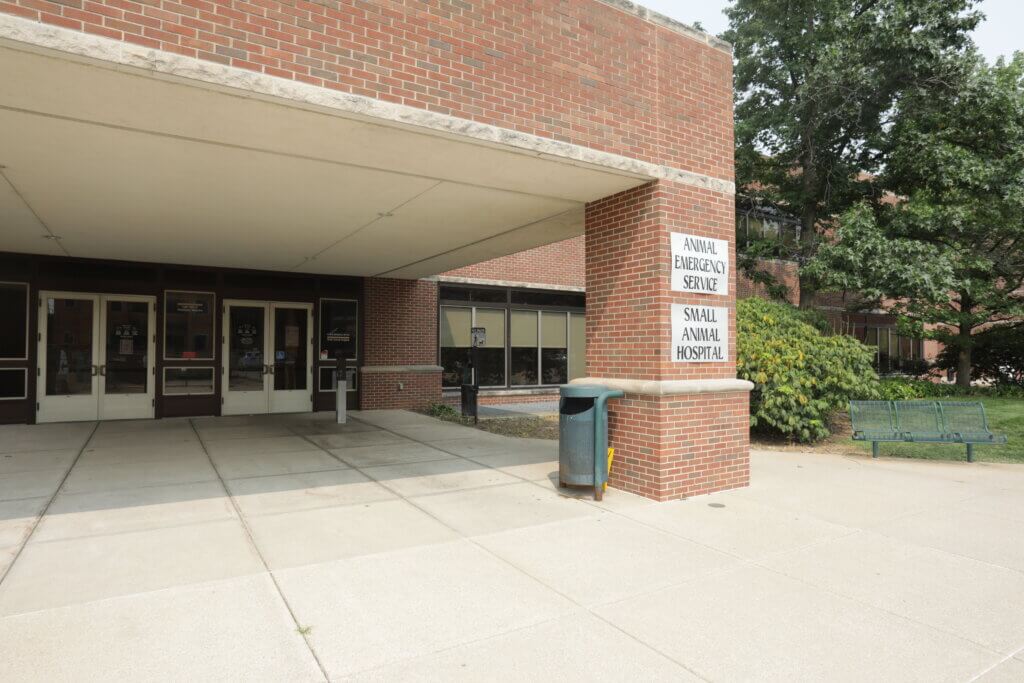
For the first time since the pandemic necessitated closing the lobbies of the Purdue University Veterinary Hospital in March of 2020, animal owners may once again enter the Small and Large Animal Hospital waiting areas. The change took effect Monday, July 26, as the Veterinary Hospital implemented a hybrid arrangement for receiving cases that replaces the strictly curbside concierge service initiated when the lobbies were closed.
Animal patients now may be brought into the hospital by their owners, but special precautions still are being followed to ensure everyone’s health and safety. “Most importantly, we ask for everyone’s understanding as we balance providing excellent patient care and service to the animal owners with ensuring the health and well-being of our clinicians, staff and students as well as the animal owners themselves,” said Dr. Nolie Parnell, Small Animal Hospital chief of staff and clinical professor of small animal internal medicine.
Specifically, the new hybrid system for receiving cases involves the following requirements and procedures:
- In keeping with Protect Purdue policies, social distancing is required in the lobby areas, which means seating is limited.
- Due to the limits on lobby capacity, only one family member will be allowed to accompany a patient into the waiting area.
- There will be opportunities for face to face communication between animal owners and clinicians. However, priority will be placed on allowing face to face interactions during first-time appointments for new cases.
- Curbside concierge service, which involves hospital staff receiving patients from their owners at their cars in the parking lot, will continue to be offered for those clients who still need to minimize direct contact with others.
- Facemasks will still be required as the Purdue Veterinary Hospital is following the recent updated CDC guidelines to address the surge in cases associated with the Delta variant.
“We understand the value of face-to-face interactions, and we also want to provide an environment where we can focus on the care and well-being of our patients as well as those who make up each pet’s care team, which includes the animal owner and the health care providers,” said Dr. Parnell.
Similar procedures and requirements are in place now for the Large Animal Hospital as well.
Dr. Parnell also said the hospital’s emergency service is experiencing record case volume, and she asked for everyone’s patience. “Animal owners may experience varying wait times as the hospital addresses the unprecedented number of emergency and urgent care cases,” Dr. Parnell explained. “Our medical teams are triaging and prioritizing cases to ensure that we can meet the needs of each pet that arrives at our hospital.”
Dr. Ellen Lowery, Purdue University Veterinary Hospital director, said everyone’s cooperation and understanding is vital during these unprecedented circumstances. “Our clinicians, veterinary nurses, students, and hospital staff, have proven themselves to be true heroes during the pandemic as we have provided treatment and care for a growing number of small and large animal patients without interruption,” Dr. Lowery said. “We are especially pleased that now we once again have our hospital waiting areas open to animal owners, and yet we must remain vigilant in following proven protocols for keeping our veterinary medical teams and the families of our patients safe and healthy.”
As these new procedures took effect, progress continued on the construction of an expansion to the Small Animal Hospital and new Equine and Farm Animal Hospitals. The new facilities are on schedule to be completed by the end of the year, with the opening anticipated in the spring of 2022.
